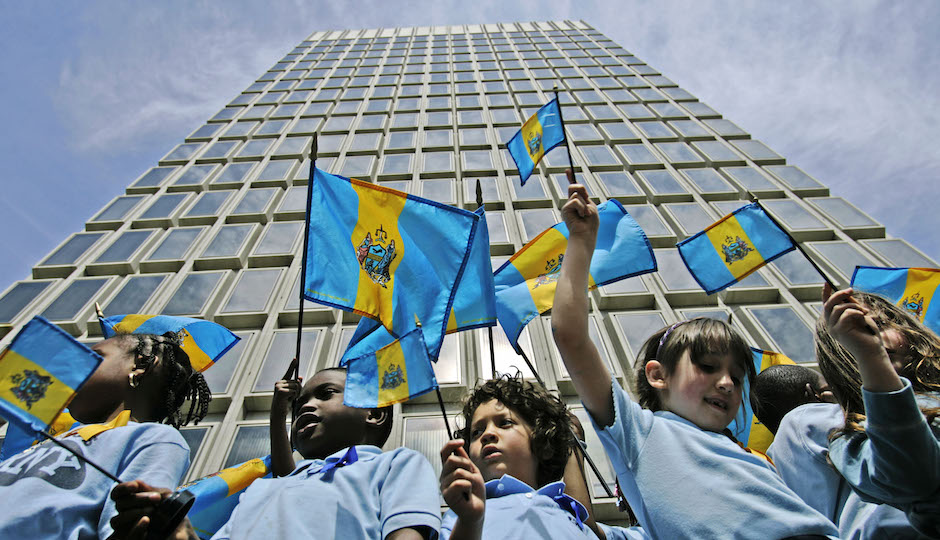Op-Ed: Join the Grassroots Movement to Support Philly’s Neighborhood Schools

Students from Kearny Elementary School wave Philadelphia civic flags and dance during a ceremony in Philadelphia. | Photo by Matt Rourke/AP
(Editor’s note: This is an opinion column from guest writers Christine Carlson, Jeff Hornstein and Ivy Olesh.)
Mayor Michael Nutter said in a recent policy address that Philadelphia needs “more parental and community involvement in our schools” and the “formal establishment of School Advisory Councils at every neighborhood school.”
As leaders in a growing citywide network of friends groups emerging to support our neighborhood public schools, we wholeheartedly support the intention behind the mayor’s proposal: to establish robust, community-driven support structures for every school, composed of stakeholders that include parents, teachers, community members and businesspeople working to ensure a quality education for every child in our city.
But what Nutter has proposed is already happening from the ground up. A number of community-organized groups have evolved organically over the past five years or so, thus far largely following the trajectory of gentrifying areas of the city. Additionally, there are numerous long-standing communities where families have for many years supported their schools.
Friends groups often focus on supporting talented school leadership and teachers who share a vision of a community-centered neighborhood school. Their contributions range in scope—from holding happy hours to raise money for copy paper and school supplies, to obtaining grants for schoolyard renovations and curricular enhancements, to recruiting volunteers to support school activities, to helping to publicize their school’s successes to the larger community.
Friends groups bring the community into partnership with schools; in addition to parents of students, they also include parents of preschool children, civic association members, retirees and local business leaders. In schools like Adaire, Chester Arthur, Childs, Hackett, Jackson, J.S. Jenks, Kearny, Key, Lea, Moffett, Nebinger, Stanton, Southwark and many others, communities have organized to support their neighborhood schools at the grassroots level. They understand the importance of these schools as anchors to thriving communities, and they are investing in the future of their neighborhoods.
The good news is that the research is clear: The rising tide of economic integration can lift all boats. The bad news is every friends group in the city is not yet inclusive and diverse; we acknowledge that this is a problem that must be addressed. As this network of friends groups grows, we seek to combine the energy and resources of these gentrifying areas with other communities where families have long thrown their weight behind their neighborhood schools, organized to prevent them from closing, advocated for adequate school funding, and more.
This past March, the three of us were part of an ad-hoc steering committee that planned and executed a half-day summit of friends groups, which drew 150 participants from more than 40 schools and organizations. At the summit, we learned from each other how to form friends groups and interact constructively with our principals and the School District of Philadelphia. We made a collective commitment to aid and abet the formation of new friends groups via peer-to-peer trainings and mentor-protégé relationships. We pledged to attempt to change the utterly negative narrative about our traditional public schools. The 150 leaders in that summit room know something the media often ignores: There are plenty of quality neighborhood public schools in Philadelphia, and there is a solid commitment to keep our neighborhood schools moving forward that is growing every day throughout the city.
In the months since the summit, numerous new friends groups have emerged. We—now known as the Friends of Neighborhood Education—launched a website full of useful resources, established regional support networks across the city to share ideas and best practices, and joined an effort to launch a small-scale philanthropic fund called the Philadelphia Public School Giving Circle, which provides resources to the most disadvantaged neighborhood schools. While this movement is currently moving forward with the support of the school district’s leadership, we intend for it to remain independent and community-driven. The steering committee of the Friends of Neighborhood Education meets monthly to share ideas and plan events.
In our view, the most durable forms of community involvement are organic, and thus our network remains independent of formal school district structures. When young residents remain in the neighborhood after they they have children, when retirees stay engaged and give young parents the benefit of their experience, when local businesses partner with their neighbors and customers, and when those without children realize the value of a quality neighborhood school, communities are strengthened. Facilitating these connections to a neighborhood school via a friends group sustains civil society and makes our city better and healthier.
We are building the infrastructure of a citywide self-help movement. We encourage more neighborhoods, the business community, the philanthropic community, the next mayor and the school district to work with us as we support the development of great neighborhood schools, one community at a time.
Christine Carlson is a member of the Home & School Association at the Albert M. Greenfield School and the founder of the Greater Center City Neighborhood Schools Coalition. Jeff Hornstein is the chair of the Education Committee of the Philadelphia Crosstown Coalition, and Ivy Olesh is a founding member and chair of the Friends of Chester Arthur.